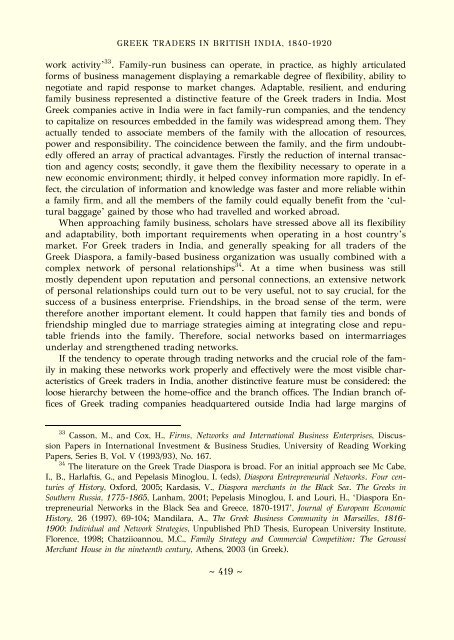Create successful ePaper yourself
Turn your PDF publications into a flip-book with our unique Google optimized e-Paper software.
GREEK TRADERS IN BRITISH INDIA, 1840-1920<br />
work activity’ 33 . Family-run business can operate, in practice, as highly articulated<br />
forms of business management displaying a remarkable degree of flexibility, ability to<br />
negotiate and rapid response to market changes. Adaptable, resilient, and enduring<br />
family business represented a distinctive feature of the Greek traders in India. Most<br />
Greek companies active in India were in fact family-run companies, and the tendency<br />
to capitalize on resources embedded in the family was widespread among them. They<br />
actually tended to associate members of the family with the allocation of resources,<br />
power and responsibility. The coincidence between the family, and the firm undoubtedly<br />
offered an array of practical advantages. Firstly the reduction of internal transaction<br />
and agency costs; secondly, it gave them the flexibility necessary to operate in a<br />
new economic environment; thirdly, it helped convey information more rapidly. In effect,<br />
the circulation of information and knowledge was faster and more reliable within<br />
a family firm, and all the members of the family could equally benefit from the ‘cultural<br />
baggage’ gained by those who had travelled and worked abroad.<br />
When approaching family business, scholars have stressed above all its flexibility<br />
and adaptability, both important requirements when operating in a host country’s<br />
market. For Greek traders in India, and generally speaking for all traders of the<br />
Greek Diaspora, a family-based business organization was usually combined with a<br />
complex network of personal relationships 34 . At a time when business was still<br />
mostly dependent upon reputation and personal connections, an extensive network<br />
of personal relationships could turn out to be very useful, not to say crucial, for the<br />
success of a business enterprise. Friendships, in the broad sense of the term, were<br />
therefore another important element. It could happen that family ties and bonds of<br />
friendship mingled due to marriage strategies aiming at integrating close and reputable<br />
friends into the family. Therefore, social networks based on intermarriages<br />
underlay and strengthened trading networks.<br />
If the tendency to operate through trading networks and the crucial role of the family<br />
in making these networks work properly and effectively were the most visible characteristics<br />
of Greek traders in India, another distinctive feature must be considered: the<br />
loose hierarchy between the home-office and the branch offices. The Indian branch offices<br />
of Greek trading companies headquartered outside India had large margins of<br />
33 Casson, M., and Cox, H., Firms, Networks and International Business Enterprises, Discussion<br />
Papers in International Investment & Business Studies, University of Reading Working<br />
Papers, Series B, Vol. V (1993/93), No. 167.<br />
34 The literature on the Greek Trade Diaspora is broad. For an initial approach see Mc Cabe,<br />
I., B., Harlaftis, G., and Pepelasis Minoglou, I. (eds), Diaspora Entrepreneurial Networks. Four centuries<br />
of History, Oxford, 2005; Kardasis, V., Diaspora merchants in the Black Sea. The Greeks in<br />
Southern Russia, 1775-1865, Lanham, 2001; Pepelasis Minoglou, I. and Louri, H., ‘Diaspora Entrepreneurial<br />
Networks in the Black Sea and Greece, 1870-1917’, Journal of European Economic<br />
History, 26 (1997), 69-104; Mandilara, A., The Greek Business Community in Marseilles, 1816-<br />
1900: Individual and Network Strategies, Unpublished PhD Thesis, European University Institute,<br />
Florence, 1998; Chatziioannou, M.C., Family Strategy and Commercial Competition: The Geroussi<br />
Merchant House in the nineteenth century, Athens, 2003 (in Greek).<br />
~ 419 ~



